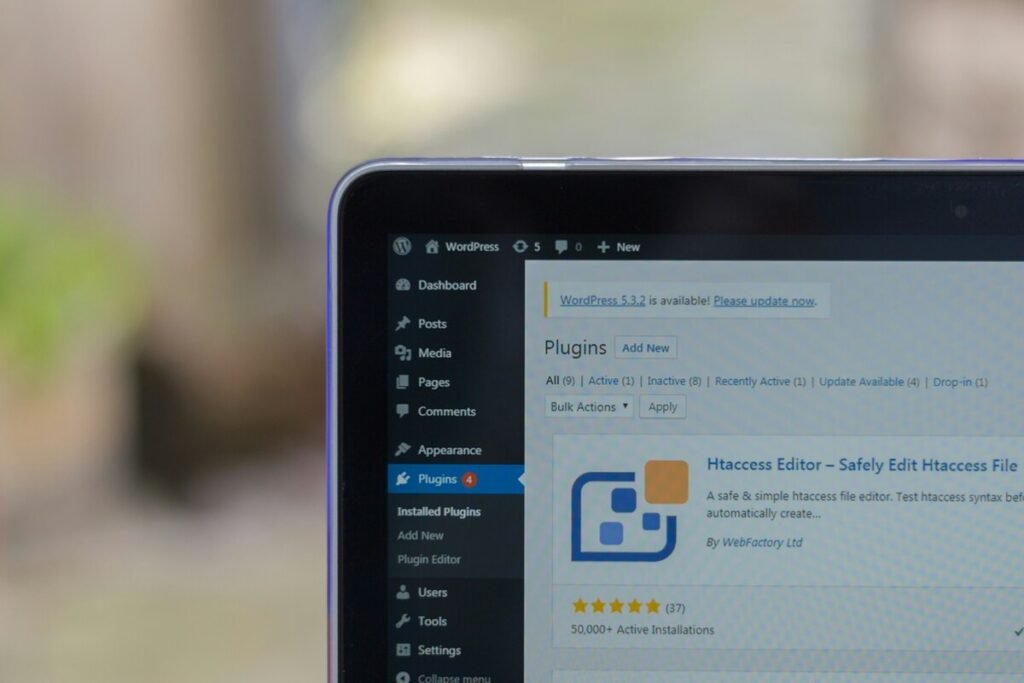Is WordPress Or Shopify Better For SEO?
Search Engine Optimization (SEO) is the practice of improving your website’s visibility on search engine results pages. The core principles of SEO involve creating a well-organized structure that allows search engines to easily crawl and understand your website’s content. Major search engines like Google and Bing use these crawls to gather data and then rank websites in their index based on factors like relevant keywords and tags. Whether you’re using Shopify or WordPress, businesses are always eager to determine which platform comes out on top in the Shopify vs. WordPress SEO competition!
As more people moved online during the Covid-19 pandemic, the demand for higher search engine rankings grew significantly. SEO, a collection of best practices, ensures that your website aligns with what visitors are searching for. A well-optimized website with strong SEO will appear higher on search results pages for relevant keywords.
Boost your SEO game with our expertly crafted SEO services.
With billions of searches on Google each day, growing organically in such a competitive market demands top-notch SEO strategies.

Why Does SEO Matter?
Before diving into the WooCommerce vs Shopify SEO comparison, it’s essential to understand the importance of SEO.
When you register your website with Google Search Console or Bing Webmaster, search engines use web crawlers to analyze your site’s content and add it to their index. Websites are then ranked and displayed on the results page based on this analysis. Google’s ranking reflects its assessment of your site; pages that are well-organized and filled with relevant content will achieve higher rankings. A better ranking on SERPs enables you to present your desired information to your audience, ultimately leading to a higher return on investment (ROI).
Most users tend to click on the first five results that appear when they search for something. When people search for keywords related to your business, they naturally become your audience, actively seeking the services you offer. Because your target audience is looking for these terms, it’s crucial to optimize your web pages for them.
By applying SEO practices, websites can guide Google to rank them higher and achieve their goals. Search engines are intelligent enough to deliver the right content to the audience, but a little assistance from you can make a big difference.
Search engine optimization can turn your website into a key destination for people seeking the services your business offers. Before we explore the differences between Shopify and WooCommerce SEO, let’s first examine their built-in SEO capabilities.

Shopify SEO
Shopify is currently utilized by over 4.5 million active websites globally, including many well-known brands.
Creating a stunning store is just one part of the equation; making it visible to your customers is equally crucial. Shopify SEO involves a range of techniques designed to enhance your Shopify website’s ranking, resulting in increased organic traffic and higher sales.
You can also leverage third-party applications to boost your rankings. Shopify offers various strategies to improve your site’s position, such as optimizing site structure, using relevant keywords, and building backlinks. With these tools and techniques, Shopify provides plenty of opportunities to expand your online presence.
Benefits of Shopify SEO
1. Effective Search Engine Optimization
Shopify offers strong built-in SEO features that are user-friendly and require minimal technical know-how. It automatically creates a sitemap, which acts as a roadmap for search engines, making it easier for them to crawl and index your site. This helps prevent penalties for lower rankings that could occur if search engines struggle to access and index your site’s content.
Other features include canonical tags, 301 redirects, and URL customization. Effective SEO can help you surpass competitors by achieving a higher rank within your niche. These advanced features enable you to handle Shopify SEO optimization on your own.
2. Mobile Optimization
Today’s internet users expect everything to be accessible from their phones. For a website to succeed, it must be responsive and function smoothly across all devices. Mobile optimization is also a key factor in Google’s ranking algorithm, making it crucial to ensure your site performs well on smaller screens. Shopify offers the advantage of mobile-friendly themes designed to enhance your site’s ranking.
3. High Speed
Shopify is a lightweight platform that uses adaptive applications, making it faster than many other eCommerce platforms, including WooCommerce. Page loading time is a crucial factor in Google’s ranking criteria. Shopify supports built-in caching, which stores a copy of your web pages to speed up load times for returning visitors.
To further enhance loading speed, you can optimize your theme and fonts, reduce image resolutions, and implement a lazy loader.
4. SSL Certificates
SSL (Secure Sockets Layer) is a standard protocol that encrypts, secures, and authenticates all online communications. These certificates include details about the website owner and are installed on the site’s server. Shopify provides SSL certificates as part of its subscription. Search engines consider SSL certificates a ranking factor, helping to establish your website’s credibility and security.
Drawbacks of Shopify SEO
1. Costly Applications
Shopify can be costly to maintain, particularly because it is designed for eCommerce rather than standard content websites. Many of the apps you need to enhance SEO and tailor the platform to your products come with a high price tag. Without these apps, your store may have limited SEO capabilities and fewer optimization options.
Shopify provides a range of SEO applications, but these can add to the cost of maintaining your store. Given the existing investment in premium Shopify themes and other tools, the additional expense for SEO apps may be a concern for some vendors.
2. URL Customization Limits
For a website to rank well, its URLs should be clean and descriptive. Long, cluttered URLs with random alphanumeric characters can confuse both search engines and users.
Consider the following URLs:
- https://eclmedia.agency/is-wordpress-still-the-best-for-seo.html
- https:/ eclmedia.agency/post-9696-is-wordpress-still-the-best-for-seo.html
Clearly, the first URL is more informative.
Search engines apply the same principle, favoring precise URLs for better indexing. Unfortunately, Shopify offers limited flexibility for customizing URLs in your eCommerce store.
3. Limited Built-In Features
Shopify’s SEO capabilities rely heavily on third-party apps. While it provides a range of features, it has fewer built-in options compared to some other platforms, which can lead to concerns about its functionality. Although there are many available apps to enhance SEO, this reliance on external tools means you must depend on these additions to fully optimize your store. Shopify offers a set of features designed to help you, but these are limited to what the platform itself provides.
4. Limited Built-In Features
Shopify’s SEO capabilities rely heavily on third-party apps. While it provides a range of features, it has fewer built-in options compared to some other platforms, which can lead to concerns about its functionality. Although there are many available apps to enhance SEO, this reliance on external tools means you must depend on these additions to fully optimize your store. Shopify offers a set of features designed to help you, but these are limited to what the platform itself provides.
Since Shopify is a closed platform, you can’t extensively refine the URL structure once it reaches its limit. The hierarchy is fixed and can’t be modified to include additional subcategories. While this setup works well for small businesses, it can pose challenges for larger companies with extensive product catalogs, making it difficult to organize products efficiently.
5. Limited Blogging Space
Shopify is primarily designed for transactional purposes, which means there is limited space for detailed blog content. Content plays a crucial role in SEO, as it allows you to incorporate relevant keywords and improve rankings. With limited blogging capabilities, it can be challenging to fully leverage content for enhancing SEO and targeting niche keywords.
However, if you decide to use Shopify for your online store, you can still enhance its search engine-friendliness by utilizing some of the free Shopify SEO apps and tools available.

WordPress SEO
WordPress powers a diverse range of websites, including blogs, personal sites, business pages, online marketplaces, and portfolios. This free and open-source platform has transformed the content management landscape and currently hosts over 43.2% of websites on the Internet
WooCommerce is a premium plugin offered by WordPress for eCommerce sites. It differs in hosting from standard WordPress setups and is known for its long-term maintainability. WooCommerce is praised for its simplicity and ease of use. Since it operates through WordPress servers, it benefits from a robust Content Management System (CMS). Let’s explore the benefits and drawbacks of WordPress SEO in detail.
Benefits of WordPress SEO
1. SEO-Optimized Code
WordPress is renowned for its strong SEO capabilities. It offers extensive options for fine-tuning your website to achieve optimal results. You can easily edit metadata on your WooCommerce store and install various plugins to enhance SEO. Unlike Shopify, which has restrictions beyond a certain point, WooCommerce allows you to download numerous plugins and access all the source code, providing greater flexibility for optimization.
2. Robust Blogging Support
WordPress excels in blogging capabilities, making it a standout choice for content creation. This strength in blogging gives WordPress a significant advantage in the SEO comparison with Shopify. The platform’s extensive blogging features allow for effective content management and keyword integration, enhancing SEO performance.
WordPress has transformed content marketing, with many popular bloggers beginning their careers on WordPress-powered sites. A WordPress-based store gives you full control over your SEO efforts. Blog posts are crucial for SERPs and play a significant role in attracting organic traffic. Unlike platforms with limited blogging space, WordPress allows you to fully utilize content to boost your SEO and engage visitors.
3. Enhanced URL Customization
Having a clear and comprehensible URL is crucial for SEO. WordPress allows for precise control over your permalinks, making them more understandable for search engine crawlers. With WooCommerce, the customization options for URLs are extensive, providing you with the flexibility to create SEO-friendly URLs that enhance search engine visibility.
SEO Plugins
WordPress SEO benefits greatly from a variety of third-party plugins that enhance your optimization efforts. A popular choice is the Yoast SEO plugin, which allows you to customize key elements of your site, including titles, meta descriptions, heading tags, and more. These plugins provide powerful tools to further improve your SEO strategy and boost your site’s performance.
Drawbacks of WordPress SEO
1. Requires Manual Expertise
Managing a self-hosted WordPress website requires a solid understanding of how the platform operates. Unlike Shopify, which is designed for lower technical demands, WordPress involves more manual configuration. This can be challenging, especially for beginners, as many details need to be set up manually. For those new to WordPress, it’s helpful to consult expert tips for effective WordPress SEO.
2. Limited Customer Support
WordPress does not offer direct phone support; instead, users must submit tickets on the support forum for assistance. If issues persist, you may need to manually search for solutions within the platform or rely on community forums. This can be less efficient compared to platforms with more direct and responsive customer support options.
3. Slower Performance
Compared to Shopify, WordPress can sometimes have slower loading times. WooCommerce might face performance issues due to hosting server limitations and the complexity of customized source code. Additionally, factors like suboptimal plugins and high-resolution images can impact speed. However, addressing these issues provides a chance to enhance your site’s performance, leading to a more optimized and faster user experience overall.
4. Theme Responsiveness
WooCommerce provides a range of themes, though some may not be fully optimized for mobile devices. While this presents a challenge, it also highlights an opportunity for website owners to choose or customize themes that enhance mobile responsiveness. By addressing this, you can significantly improve user experience and ensure your site performs well across all devices.
Conclusion
Consistent and effective SEO practices are key to achieving great results. Both Shopify and WordPress are leading eCommerce platforms that continuously evolve to offer users the best possible tools and features. The debate over Shopify vs. WordPress SEO remains ongoing, and choosing the right platform depends on your specific needs and preferences. Each has its strengths and challenges, so consider which aligns best with your business goals and technical comfort.
Your choice of platform should be based on your business requirements. WordPress offers extensive control over SEO and ample space for content, making it ideal for detailed optimization and content marketing. Shopify, on the other hand, provides a user-friendly experience with quick setup and a range of useful apps. While Shopify boasts fast loading times, WordPress excels in content marketing. Both platforms offer advanced SEO features to help boost your store’s rankings, so consider which aligns best with your specific needs and goals.
After comparing Shopify SEO with WordPress SEO, the choice between the two depends on your specific needs. It’s important to thoroughly evaluate each platform’s features and how they align with your business goals. Your budget can also play a crucial role in deciding which platform is right for you. If you seek a highly personalized brand experience, WordPress might be the better option. However, if you prefer a platform with premium features and a streamlined setup, Shopify could be the ideal choice for your online store.
The decision may also depend on your technical expertise and willingness to engage in manual SEO efforts. WordPress offers extensive space for implementing SEO best practices manually, which requires a good level of technical knowledge. In contrast, Shopify provides many tools and features that are user-friendly and require minimal technical input. While both platforms support third-party applications, if your needs lean towards more in-house features and customization, WordPress might be the better fit. On the other hand, if you prefer a more streamlined, click-and-go approach, Shopify could be the right choice.
Ultimately, the best platform for your business depends on your specific needs. If you’re looking for a solution with high technical flexibility and ease of use, Shopify may be the right choice. Conversely, if you desire a highly customizable website to craft a unique brand story, WordPress offers the tools and flexibility you need. Consider your business goals and technical comfort to make the best decision.
For expert guidance on selecting and optimizing the right platform for your business, Eclipse is here to help. We offer a range of services including Consultation, SEO, Google Ads, and Web Design to ensure your online presence is effective and impactful. Let us assist you in achieving your digital marketing goals and building a successful online store.
